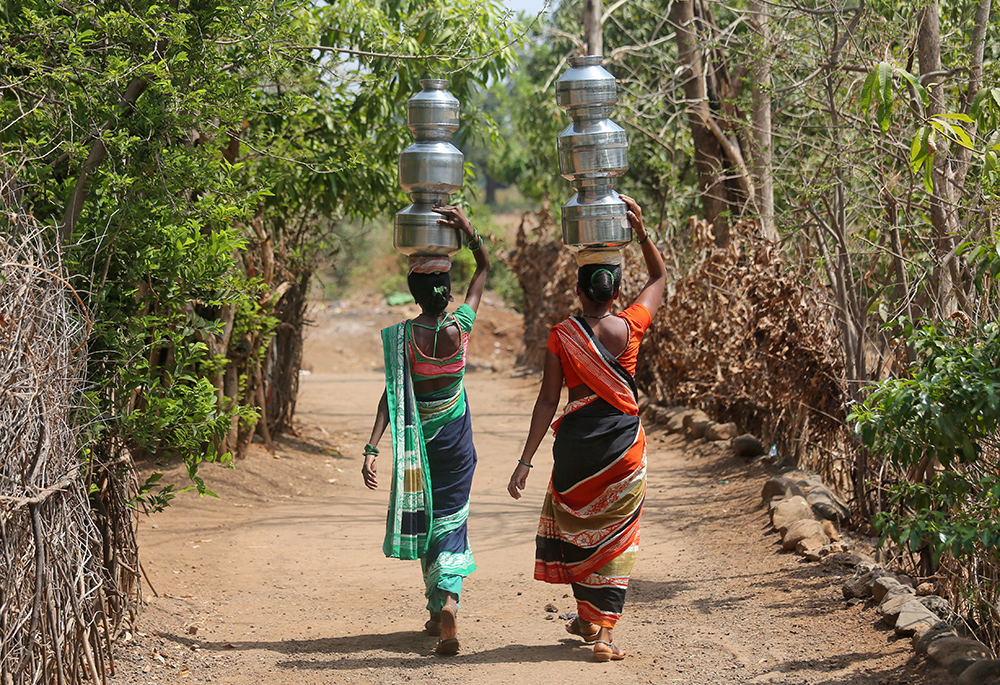
Women in Thane, India, carry water to their houses May 30, 2019. (CNS/Reuters/Francis Mascarenhas)
God created everything beautifully and satisfactorily and rested on the seventh day. Among his creations, humankind is his masterpiece. Women and men are unique in God's creation because God wanted to create them as his own. In the Old Testament, God compares his love to a mother's love: Can a woman forget her nursing child or show no compassion for the child in her womb? Even these may forget, but I will not forget you (Isaiah 49:15).
God created women to be beautiful, powerful, loving, and caring and to share in his role as creator. Biblical teachings promote equality among men and women, as we believe we are created in his image and likeness. God entrusted Eve with the greatest responsibility of being a mother to humanity, and later, Mary became the co-redeemer of humanity by bringing Jesus into the world.
From the beginning of time, God has seen women as co-creators and has entrusted them with the mission of caring for and nurturing, yet as God's children, we have failed to respect women, their rights, and dignity with an ever-inclusive approach in every aspect. Today, women face the challenges of equality not only in society but also in the church.
The foundation and values of the Christian faith encourage us to treat women equally, as they are part and parcel of society. However, in our own families, we do not educate our children and family members to respect women, their rights, and their dignity. Men beat their wives in front of their children, family members, or others despite the fact that violence against women is a sin. Even Christian men use violence as a tool for obedience because they think wives and children are the husband's property.
My friend was married at 18 against her will and gave birth to a daughter the following year. When she and her husband had marital problems, her whole family took her husband's side and asked her to reconcile with him. The statement from my friend's mother that "women are slaves to their husbands" shocked me because we live in the 21st century, where we talk about women's freedom and empowerment.
Children learn from their parents and elders. When children see their father hitting their mother, a boy learns to abuse women, and a girl who sees her mother being abused thinks it is normal. Today, in India, women are subject to domestic violence more than ever, especially those who live in villages. Male dominance traumatizes kids and robs them of their childhood, leaving deep psychological scars and trauma on young children who need healing and reconciliation later in life.
I come from a family where women are the majority in number, but importance is always given to men and boys. I was told girls and women should eat less, shouldn't raise their voices, and must always depend on their counterparts. My 7-year-old brother and I, a 13-year-old girl, were given the same amount of food for breakfast. If I asked for more food, my mother told me girls couldn't eat more. Statements like these make girls insecure about everything, fearful and dependent. Women must raise their voices for their mothers, sisters, and daughters' freedom and dignity. These rights are due and proper to them. This must change for the better.
In families like many in India, women are used only for household work, whereas men make the decisions for the family. It is essential to educate both men and women to have the same right to take the lead in parenting and to share love and responsibilities. Girls and boys must be taught that they have equal rights in everything, and should aspire to be responsible and committed citizens. Children must learn from a young age that men and women are equally created to contribute to their families, church and society. Women are called to be changemakers for their destinies.
Advertisement
In their roles as co-creators, women are called to care and nurture, yet, the male-dominating nature makes it impossible for women to fulfill their calling. Jesus respected his mother as well as his female disciples. He chose women disciples precisely because he needed that care and nurturing that only the female presence could provide.
The church is the place where we learn to have faith in God and are taught to grow as a faith community. Yet, women and girls, including nuns, face challenges and discrimination. Women are usually limited to leading the rosary, cleaning the church, and decorating the altar. Most altar servers are boys because, in some dioceses, girls are not allowed to serve after puberty. Women are excluded from the church's decision-making body. Women are scarce on parish councils and finance committees. Even if they are present, they do not talk much to influence the gathering.
In Catholic institutions, women are assigned menial jobs and paid less than men. Catholic nuns in the church face the same issue. The men always study the church documents and teach the faith. This situation should change. Women have to partake in the church's mission to teach, guide, and lead the flock of Christ, for they, too, are responsible for building up the kingdom of God. In his apostolic exhortation, Evangelii Gaudium, Pope Francis wrote (quoting pontifical writing): "Because 'the feminine genius is needed in all expressions in the life of society, the presence of women must also be guaranteed in the workplace' and in the various other settings where important decisions are made, both in the Church and in social structures."
Women are capable administrators. They can lead the church too.
If we are truly driven by our belief in Jesus, we cannot remain silent about the status of women in society. We cannot continue practicing traditions and customs that suppress and dehumanize women. According to statistics cited in the Policy of Dalit Empowerment by the Catholic Bishops' Conference of India, three Dalit women are raped every day. Society keeps on looking the other way. Carrying on traditions makes it impossible for women to be treated equally. Women, in turn, must not normalize being mistreated. Every offense against women is a wound to the heart of God.
As women share the co-creator role, they must care for and nurture family, church, and society and share equally in teaching, guiding, and leading, thus building up the kingdom of God.
We need it as much as the next generation.








